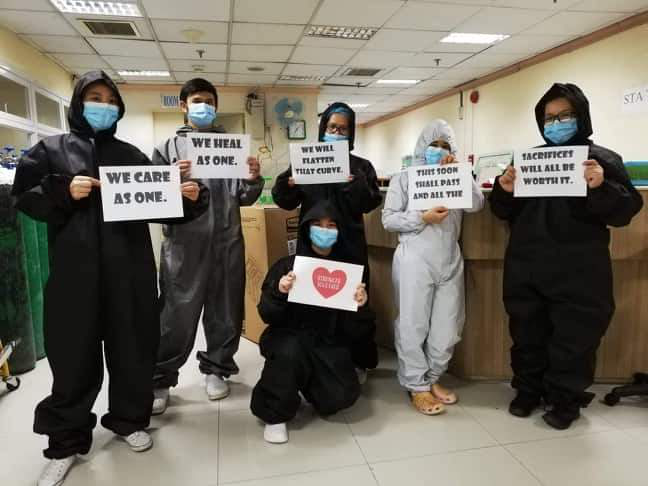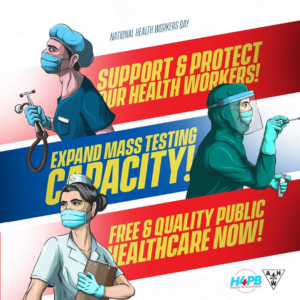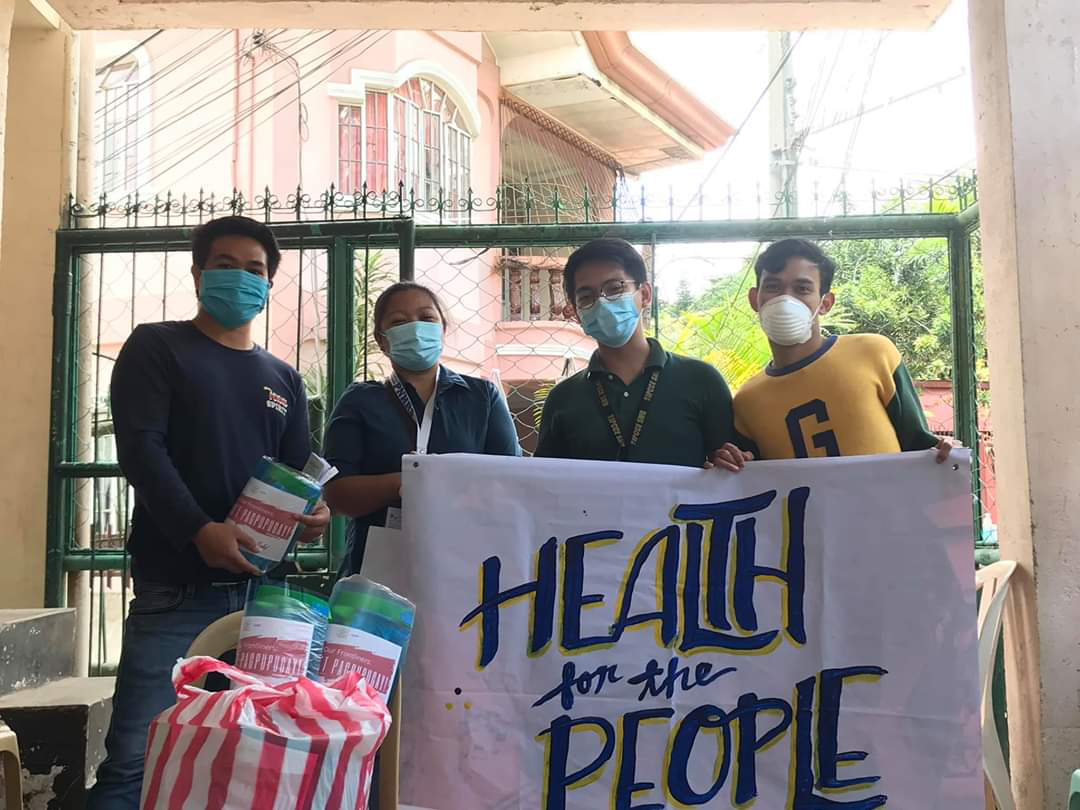by Community Health Education, Services, and Training in the Cordillera Region (CHESTCORE)

Photo courtesy of nurses from the Baguio General Hospital and Medical Center (BGHMC)
The first coronavirus (Covid-19) case in the Philippines was recorded on January 30, 2020, and three days later the first death on February 2. On March 7, six cases were confirmed including the first local transmission. This prompted the Department of Health (DOH) to declare alert level 4 (code red) sublevel 1, which means the government should prepare to respond to possible increase in positive cases, intensify contact tracing, and expand monitoring and surveillance of Severe Acute Respiratory Infections (SARI). The government should also prepare for possible community transmission and activate subnational laboratories for increased testing capacity. This pressed the enforcement of home quarantine measures to help delay possible transmission and hasten contact tracing. On March 8 the government proclaimed a state of public health emergency as cases rose to 10. Enhanced Community Quarantine (ECQ) was declared over the National Capital Region on March 15 and was expanded to cover the entire Luzon island on March 17. ECQ limited the movement of individuals, suspended public transportation and allowed only essential services – food, communication, water and electricity, and health care. Only on May 1 was the less restrictive General Community Quarantine (GCQ) implemented in the Cordillera region.
Covid-19 cases have continued to rise despite quarantine control measures. As of August 14, confirmed cases had reached 153,660, of which 79,813 were active cases; 71,405 recoveries; and 2,442 deaths. The Cordillera region recorded 503 cases, 221 of these in Baguio City.
The longstanding and systemic lack of health services greatly impacted the Philippine health system’s capacity to respond to such a pandemic or any other epidemic in general. In addition, nutrition and overall health are affected by the glaring poverty of the majority of citizens. Health statistics have remained unchanged for decades. Leading causes of diseases and death still include preventable and curable diseases such as pneumonia. Double burden in malnutrition has emerged as a problem. Stunting and wasting remain high in children below 5 years of age. Alarmingly there is an increase in chronic energy deficiency, overweight and obesity in adults 20 years of age and above.
The government poured resources from public funds, grants and loans from the international community and contributions or donations from the private sector into its Covid-19 response leaving other facets of public health underfunded. While Covid-19 deserves such attention at this time due to its effects on life and health, it can also be taxing on the already frail health system. Equally dreadful diseases should not be taken for granted as though these were on leave at this time of the pandemic.
And even during this national health crisis, corruption plagues government’s response. The DOH has been in audience with other government bodies such as the Senate and the Office of the Ombudsman due to alleged overpriced personal protective equipment (PPE) sets and nucleic acid extractor and swabbing systems for RT-PCR tests. The same issue stains the distribution of economic aid.
Higher testing capacity has been highlighted by the DOH, with the increase in the number of accredited laboratories and available testing kits. A total 66 accredited testing centers, of which 38% were private testing centers, were operating as of June 16. This had increased by early August to 100 licensed testing laboratories throughout the country, as reported by DOH. A pronouncement to start mass testing by April 13 was later met with public disappointment after the government admitted there was no plan to do so. Instead the DOH listed qualifications for so-called expanded targeted testing. Qualifications include health frontliners, those with severe symptoms and direct contacts of Covid-19 positive individuals.
With the glaring lack of national government support, local government units are left on their own. They can only do so much with the limited resources they can access. In Baguio City, for instance, although the Baguio General Hospital and Medical Center (BGHMC) is one of the designated subnational laboratories, testing kit supplies from the national government are lacking. Health professionals have been vocal in exposing this and calling out the national government on social media. Pushed by the slow response from the national government and increasing backlog in testing, the Baguio City government initiated to purchase its own test kits.
The government is focusing its responses on the medical aspect like providing hospitals with PPEs, testing kits, and a fat incentive for research and vaccine search. Its non-medical response is limited to public advisory for frequent hand washing with strong germicidal soap, wearing of masks and one-meter physical distancing.
Its responses are found wanting in terms of preparing the populace physically and mentally, such as promoting healthy habits and lifestyle. Strengthening a person’s immunity should have been the focus of relief and medical responses. Instead of canned goods and instant noodle soup packs it could have provided healthier alternatives and embarked on disseminating information on what foods to eat and how to maintain or strengthen one’s immunity to disease-causing viruses.
Disease prevention and health promotion are the vital preparation regimen for any infectious diseases. Maintaining a healthy lifestyle helps strengthen immunity. This is one side of the equation, the other the virus/pathogen. A virus such as the coronavirus can be fought with a strong immune system. Thus, ensuring a sustainable source of nutrient-rich foods in the locality is essential. Acupuncture, whole unprocessed foods, exercise, exposure to morning sun and enough nighttime sleep may be the least that can help strengthen immunity from diseases, not only Covid-19.
Health workers

Overworked and undercompensated, health workers in the country have yet another risk to take. The country has lost several of its finest health workers who succumbed to the disease. As of August 3, a total of 5008 health workers had contracted Covid-19, 4,576 of whom have recovered and 38 have died. Of the total, 1,734 were nurses; 1,100 physicians; 338 nursing assistants; 210 medical technologists; 119 radiologic technologists; and the rest, sundry medical workers.
Health workers contracting the disease could be attributed to several factors including lack of appropriate PPE in the workplace especially at the onset of the pandemic. To date even with the procurement of millions of pesos worth of PPE, many health workers especially in the communities improvise or re-sterilize PPEs due to the limited supply reaching them. Several interviewed health workers in district health centers in Baguio City revealed that they wash and sterilize through autoclaving disposable PPEs.
“Dito sa Irisan Health Center meron silang binibigay na mga PPE pero kung day-to-day basis na gagamitin namin hindi po siya sapat. Usually, karamihan ng mga binibigay na PPEs disposable pero dahil kulang ginagawa namin siyang reusable. So parang kami nalang po ang nag-aadjust. (Here at the Irisan Health Center, we are given PPE but if we use it on a day-to-day basis, it is not sufficient. Usually we are given disposable PPEs but since these are not enough we make them reusable. We have to adjust),” said a health worker of Irisan barangay in Baguio City.
Because of stigma and fear of discrimination, some patients lie about their travel history and symptoms to avail of health services, risking infecting health workers and other patients seeking health services. Cases of discrimination have been reported by health workers nationwide. They experienced being thrown out of their apartments and not being allowed to ride public transport among others.
Many more health workers have been included in the list of Person Under Investigation or suspected case and Person Under Monitoring or probable case, which further diminishes the already depleted health workforce. Adding insult, the DOH called for volunteer health workers and later allocated compensation of Php 500.00 per day of service. This was confronted by resistance from the health sector, which has become more vigilant due to its long history of exploitation. Health workers demanded mass hiring with appropriate salary and compensation instead of heeding DOH’s call for volunteers. As the national government was calling for volunteers, the local government of Baguio through lobbying of nurses opted to hire additional nurses to augment the existing workforce. The campaign for additional hazard pay also continues. The Philippine Nurses Association-Cordillera Administrative Region further urges observance of paid leaves for nurses who were required to undergo 14-day quarantine due to Covid-19.
The suspension of public transport early on in the lockdown left health workers to find means to reach their workplace. The majority had to walk several kilometers to and from their workplace. Those coming from Irisan, Kias and La Trinidad were compelled to walk 7-8 kilometers, entailing a 1.5-2 hour walk one way, to reach Baguio General Hospital and Medical Center. This meant additional 3-4 hours taken from their time for family, rest and other responsibilities. Local government units were left to find ways to help the health workers. In Baguio City, as early as the second day of ECQ implementation, hospitals and other health institutions were encouraged to provide shuttle services. Barangay vehicles were also allowed to ferry health workers and a few public utility vehicles were given permits for this purpose. Transportation for health workers at least has been ensured and practiced throughout ECQ and GCQ. In the National Capital Region and other areas under ECQ, health workers continue to deal with lack of public transportation. Health workers were compelled to purchase bicycles, motorcycles or cars as their means of transportation.
Health workers are also calling for mass testing. As Carmern Bolinto, a health worker with the Philippine Nurses Association, said, “We have been demanding for mass testing but it has never been given to the people especially for the health workers. So one of the demands to shout out to the government would include increasing the capacity of hospitals and health care system for mass testing prioritizing health workers, and all the vulnerable groups should also be considered for mass testing.”
The mental wellbeing of health workers is a major concern at this time. The stress they are exposed to during 12-24 hour shifts are worsened by their work environment, fear of possibly infecting loved ones, discrimination they experience, physical fatigue and other factors. It is very important that health workers are also processed for psychological resilience. Called heroes in the fight against Covid-19, health workers need more support. Economic compensation has yet to be fulfilled; their democratic rights, health and safety have to be protected.
Helping fellow frontliners
With the limited supply of personal protective equipment provided by the government, health workers were left to endure the risk of contracting the disease in the early phase; they later procured their own PPEs out of their own pockets. “The healthcare system is grappling with what to do with the growing number of cases. We formed a big group of nurses headed by the PNA [Philippine Nurses Association] and also the Health for the People Brigade. We were partners in mobilizing for making personal protective equipment; we started with improvising masks, face shields and all other equipment that we can utilize because the supplies in the pharmacies in all distributing companies were not sufficient anymore,” Bolinto said.
The Health for the People Brigade (H4PB) is a network of individuals and groups in the health, science and medical sectors that aims to assert people’s right to health in various issues and situations. It was re-launched last March 18 to respond to the needs of medical and health frontliners. In coordination with Cordillera Nurses Bridage for Covid-19 and Philippine Nurses Association Baguio City Chapter, they produced and distributed improvised PPEs to health frontliners in different public and private hospitals in Baguio City, Benguet and Mt. Province. For frontliners in the communities, H4PB as of June 10 was able to distribute 1,299 sets of PPE containing improvised face shields, washable face masks, gloves and vitamin C tablets to frontliners in Baguio City’s 10 district health centers and 53 barangays as well as neighboring municipalities. Production and distribution will continue to cover other areas. H4PB also distributed vitamin packs to 81 individuals and 66 families with senior citizens, individuals with medical condition, nursing mothers, pregnant women and children under 12 years of age. They also gave out bottles of alcohol.
Aside from PPEs, ear guards were produced and distributed to health workers in hospitals. The production was a community effort involving volunteers across ages who worked in their own homes. Senior citizens and those with co-morbid medical conditions crocheted and children volunteers sewed buttons to complete the ear guards.
The spirit of volunteerism is high even in times of calamities or epidemics. Health professionals, students, teachers, stranded individuals, cultural workers, out of school youth were among those who willingly volunteered. The limitation in transportation and restriction of travel to market schedule per district did not hinder their willingness to contribute their time and effort.

Calls to government
The people of Baguio make the following calls to combat Covid-19 and ensure everyone’s safety and health:
First, conduct immediate local mass testing and distribution of masks. Undertake testing with right supplies and facilities. This includes funding for testing kits and personal protective equipment like masks for local mass testing and distribution.
Second, support local health workers and other frontline workers including government personnel who continue to work during medical emergencies with necessary compensation and support. Ensuring their safety and preparedness entails distribution of PPEs like masks, gloves, and alcohol.
Third, ensure community-level health services and responses. It is through supporting and funding community-level health units like Barangay Health Units for immediate medical response, especially in far-flung or hard-to-access communities. Triage and detection sites should be provided to ensure efficient response in suspected cases. This includes funding procurement of sanitizing tents and/or wash areas to encourage the public to disinfect themselves.
Fourth, ensure affordability and delivery of food, medicine, and basic products. Fulfill the government’s obligation to provide enough nutritious food and other basic provisions during a crisis, especially for the elderly, disabled, the poor and unemployed. Ensure supply of medications such as maintenance medications and vitamin supplements supporting people’s overall health and immunity to Covid-19. Safeguards to prevent price increases of basic goods should be provided.
Fifth, ensure accessibility and continuity of public services. Continue to deliver basic utilities and ensure that consumers are given grace periods or emergency relief/exemptions for payment of bills. Prevent increases in charges in basic utilities.
Sixth, uphold workers’ right by giving in full the salaries and benefits of workers, including contractual and non-regular workers. Provide emergency employment and cash transfers for workers who will be unemployed during lockdown. Ensure safety of employees who are mandated to report to work during quarantine. It includes prevention of mass lay-offs, unpaid forced leaves, and extended working hours of workers.
Seventh, provide immediate financial aid for indigent/urban poor families. Financial aid should be immediately delivered to enable them to purchase basic needs during enhanced community quarantine.
Lastly, ensure respect for rights and accountability. The local government should foremost respect civil, political and socioeconomic rights of the people; it should be accountable especially when rights are violated.
